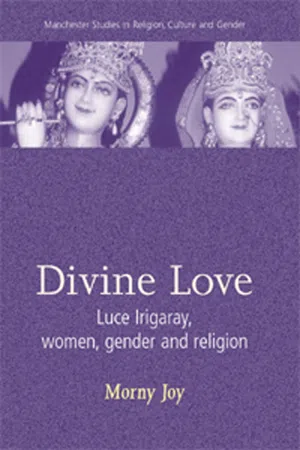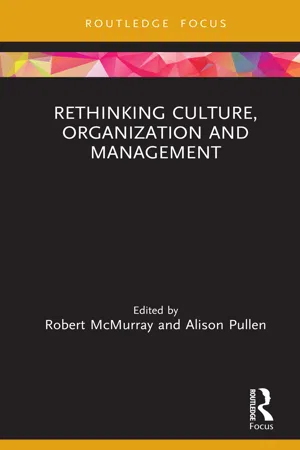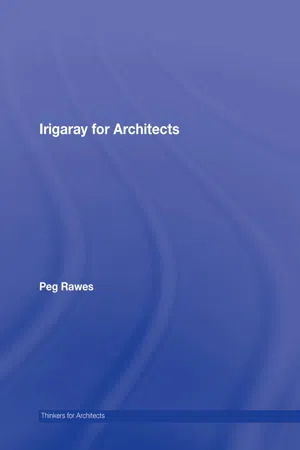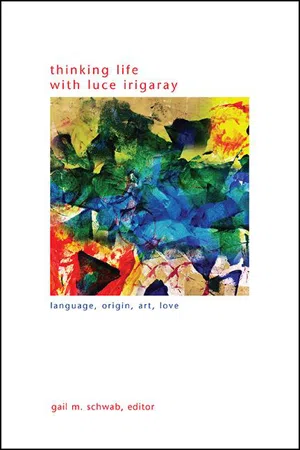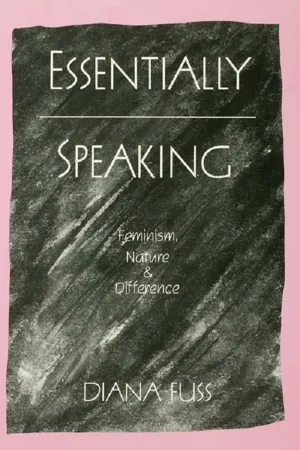Luce Irigaray
Luce Irigaray is a prominent French feminist philosopher known for her work on gender, language, and psychoanalysis. She critiques traditional Western philosophy and explores the ways in which language and culture perpetuate gender inequality. Irigaray's writings often challenge the male-dominated literary canon and advocate for the recognition of women's experiences and voices in literature and society.
7 Key excerpts on "Luce Irigaray"
- eBook - ePub
Divine love
Luce Irigaray, Women, Gender, and Religion
- Morny Joy(Author)
- 2013(Publication Date)
- Manchester University Press(Publisher)
...Introduction: encountering Irigaray Luce Irigaray is a formidable and passionate presence, both in person and in her writings. She has charted a unique course of enquiry into the contemporary situation of women. In so doing, Irigaray has not identified herself with any particular movement. Irigaray declines the term ‘feminism’. She does not accept ‘-isms’ of any variety, as she indicates that they constrict the free play of exploration. ‘Male-bashing’ is also not a word that can be used to discredit Irigaray’s commitment to change both the personal and social conditions that have restricted women. She believes that a new form of relations between man and women – an ethics of sexual difference – needs to be established. This ethics and its mode of mutual recognition will foster the emergence of a culture where love can flourish. Because of these ideas, Irigaray has been regarded as a utopian. In response, she has described herself as a defender of the impossible (I Love to You, 1996: 9–10), emphasising, none the less, that the transformation she advocates can and needs to be achieved. It is a difficult task to introduce Luce Irigaray’s work, particularly her ideas on religion and God. Primarily, this is because she does not want be identified with any orthodox religious tradition. Secondly, and more importantly, Irigaray does not want to be classified according to conventional academic categories (Hirsh and Olson 1995: 100). Irigaray is particularly averse to answering substantive questions that ask her to clarify her ideas. She believes that her work speaks for itself. Arid and tedious intellectual analysis is anathema. Irigaray has described her work as providing ‘beacons’ (Hirsh and Olson 1995: 102). These are to be appreciated as flashes of light probing uncharted territory that, on further investigation, will reveal multiple and unpredictable possibilities...
- eBook - ePub
- Robert McMurray, Alison Pullen, Robert McMurray, Alison Pullen(Authors)
- 2020(Publication Date)
- Routledge(Publisher)
...5 Luce Irigaray’s philosophy of the feminine Exploring a culture of sexual difference in the study of organizations Sheena J. Vachhani Since the publication of Speculum of the Other Woman, Luce Irigaray has founded some of what can now be thought of as the central claims of poststructuralist French feminism. Irigaray makes a turn to embodiment where the body is a site for the creative possibilities of the body, and her work initiates visceral and embodied forms of thinking about organizations. Irigaray intervenes in a number of philosophers’ work, from Plato to Nietzsche, as a way of unearthing the silent feminine and making it present. Irigaray’s work has gained prominence in management and organization studies and this chapter outlines the contribution of her work to ideas around: the question of difference and the ethics of sexual difference; the influence of psychoanalysis and the maternal in her work; critiques around biological essentialism; and, processes and strategies of writing that disturb and disinter conventional textual practices. Her analysis of Western philosophy centres on the critique of the existence of one subject, the masculine subject conceived through patriarchal order, that is to say the predominance of masculinity for understanding social and symbolic life. In Irigaray’s words, ‘It is not a matter of toppling that order so as to replace it – that amounts to the same thing in the end – but of disrupting, and modifying it, starting from an “outside” that is exempt, in part, from phallocratic law’ (Irigaray, 1985b: 68). Irigaray has been accused of perpetuating essentialist readings of identity and sexed bodies, however, proponents of her work suggest that her writing can be read as a form of strategic or political essentialism (Stone, 2006). Irigaray was born in Belgium in 1932 and holds doctoral degrees in Philosophy and Linguistics; she also trained as a psychoanalyst...
- eBook - ePub
- Elizabeth Grosz(Author)
- 2020(Publication Date)
- Routledge(Publisher)
...Chapter 4 Luce Irigaray and sexual difference O NE of Kristeva’s most articulate contemporaries is Luce Irigaray, who is also a psychoanalyst, philosopher and feminist theorist. They share a number of striking similarities, which is not altogether surprising given their similar training, background, orientation and interests. But less noted in the secondary literature on French feminisms are the major differences and disagreements that place them on opposing sides in a number of theoretical controversies and political issues. In analysing Irigaray’s contributions to French feminist theory, the similarities— and differences — will need further elaboration. While both rely on a series of shared terms and theoretical frameworks (including the work of Lacan and Derrida), the similarities are largely superficial. Identifying them too closely obscures political and intellectual differences, differences in ‘styles’ of writing, in objects of investigation, in methods of analysis and in overall objectives. Irigaray is perhaps best known outside France as the most active and vocal advocate of the concept of sexual difference. Given her training in Lacanian psychoanalysis and her interest in Saussurian, structuralist and poststructuralist linguistics and language 1, her position seems close to and compatible with Kristeva’s understanding of sexual difference. Indeed, both are commonly described as feminists of sexual difference. 2 Yet, as outlined in the last two chapters, Kristeva’s understanding of sexual difference entails the dissolution of all sexual identities and converts the feminist aspiration of establishing an identity for women into a dispersed process of sexual differentiation relevant to both sexes...
- eBook - ePub
- Peg Rawes(Author)
- 2007(Publication Date)
- Routledge(Publisher)
...CHAPTER 2 Situating Irigaray Luce Irigaray was born in 1930 and has French nationality. Growing up in Belgium to parents with Belgian, Italian and French ancestry, Irigaray’s academic training began in Louvain, Belgium, where she studied for a degree and then completed a doctorate in French and Philosophy in 1955. After teaching in secondary education for a number of years she took a second degree in psychology and a Diploma in psychopathology at the Sorbonne in Paris. Also during this period she trained as a psychoanalyst and attended Jacques Lacan’s seminars on psychoanalysis. Then, from 1964, she worked as a researcher at the National Centre for Scientific Research, later becoming a research director at the Centre in 1986. Between 1970 and 1974 she taught at the University of Vincennes, and was a member of the Ecole Freudienne de Paris. In 1973 she submitted two further doctorates, one on poetics and psychopathologies, and Speculum de l’autre femme, which was rejected by the University and resulted in her leaving her teaching position. However, Speculum was very quickly published, in 1974, and Irigaray’s subsequent career has been significant, including: receiving international visiting professorship appointments; giving international lectures and seminars; and working with feminists, women’s groups and democratic movements, especially in northern Italy (for further discussion of Irigaray’s biography and intellectual career, also see Margaret Whitford’s introduction to The Irigaray Reader [1991b] and Irigaray’s preface and section introductions to Key Writings). Broadly speaking, three phases of Irigaray’s writing can be observed in her work from 1974 to the current day. Irigaray’s experiences of academic training are most strongly reflected in the first phase of her writings from 1973 to the mid 1980s...
- Alan D. Schrift(Author)
- 2014(Publication Date)
- Routledge(Publisher)
...14 Luce Irigaray Mary Beth Mader The immediate, natural and necessary relationship of human being to human being is the relationship of man to woman. In this natural relationship of the sexes man’s relationship to nature is immediately his relationship to man, and his relationship to man is immediately his relationship to nature, his own natural function. Thus, in this relationship is sensuously revealed and reduced to an observable fact how far for man his essence has become nature or nature has become man’s human essence. Thus, from this relationship the whole cultural level of man can be judged. (Karl Marx, Economic and Philosophical Manuscripts, 1844) 1 Luce Irigaray 2 is a French philosopher, linguist, psychoanalyst, activist, poet, and author of more than twenty books, many of which have been published in translation around the world. She is best known for her critique of the conceptual, practical, psychological, philosophical, spiritual, and political quasi-exclusion of women, and of things culturally coded as feminine, from the central institutions, customs, texts, and collective imagination of the canonical cultures of the West. Aside from this critique, her chief project has been to think out possibilities for the development of two sexuate cultures, and to craft proposals for specifically political innovations – in sexuate civil rights, for example – critical to the advent of a true culture of sexual difference. This aim reposes on the foundational charge that present cultures of the West are pseudo-heterosexual social orders. 3 The claim is that they are essentially male monocultures that understand and imagine women and girls as deficient versions of a single human ideal, a standard that covertly is not neutral but is sexed and male. More precisely, thinking about the sexuate nature of human beings has only and always been carried out on the basis of a single sex that is allegedly already known: that of men and boys...
- eBook - ePub
Thinking Life with Luce Irigaray
Language, Origin, Art, Love
- Gail M. Schwab, Gail M. Schwab(Authors)
- 2020(Publication Date)
- SUNY Press(Publisher)
...As Irigaray maintains, “language as art will never be universal nor permanent, but at the service of the embodiment of each one in their own singularity. This presupposes that this sort of language aims to express and share our complete energy [, …] discovering another manner of entering into communication that gives voice to our whole being in the present and allows the respect for our differences” (35). In Thinking Life with Luce Irigaray: Language, Origin, Art, Love, readers of Irigaray, along with and led by Irigaray herself, occupy a living environment that is dense, fertile, rich, and diverse, variegated in tone, color, shape, direction, and intention—a creative space of/for thinking and writing. May this fecundity continue to bear fruit in language, in art, in love, and in politics into a living future, sustaining individual freedom in subjectivity and collective freedom in democracy. Notes In attempting to create a context for Thinking Life with Luce Irigaray: Nature, Origin, Art, Love, I have discussed, or merely mentioned, the work of many fine scholars whose work I respect and admire, but there are just as many and more whose work I was unable to recognize due to space constraints. I ask for understanding from those whose names don’t appear here. Works Cited Bainbridge, Caroline. 2008. A Feminine Cinematics: Luce Irigaray, Women, and Film. Basingstoke: Palgrave MacMillan. Bolton, Lucy. 2015. Film and Female Consciousness. London: Palgrave MacMillan. Cimitile, Maria C., and Elaine P. Miller, eds. 2006. Returning to Irigaray: Feminist Philosophy, Politics, and the Question of Unity. Albany: State University of New York Press. Fielding, Helen. 2001. “Only Blood Would Be More Red: Irigaray, Merleau-Ponty, and the Ethics of Sexual Difference.” Journal of the British Society of Phenomenology 32:2, 147–59. ———. 2004. “Luce Irigaray: To Paint the Invisible, Translation and Interview.” Continental Philosophy Review 37:4, 389–405. ———. 2008...
- eBook - ePub
Essentially Speaking
Feminism, Nature and Difference
- Diana Fuss(Author)
- 2013(Publication Date)
- Routledge(Publisher)
...But before turning to a consideration of Irigaray's strategic use of essentialism, it bears emphasizing that most of the criticisms leveled against Irigaray's work since the publication of Speculum de l'autre femme in 1974 are inevitably based upon or in some way linked to this fear of essentialism. A summary sample of the most important and oft-cited of these criticisms is enough to demonstrate how impassioned and genuine the resistance to essentialism is for many feminists, and how problematic the reassessment of essential-ism's theoretical or political usefulness is likely to be. Irigaray and Her Critics In 1981, two critical essays on Luce Irigaray's work were published in the U.S., each in a well-known feminist academic journal: Christine Fauré’s “The Twilight of the Goddesses, or the Intellectual Crisis of French Feminism” appeared in Signs, and Carolyn Burke's “Irigaray Through the Looking Glass” appeared in Feminist Studies. Fauré’s critique, a translation from the French, is unquestionably the more severe...
